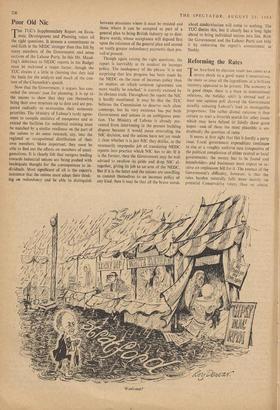Poor Old Nic T kiE TUC's Supplementary Report on Econ. omic
Development and Planning raises all the right questions. It stresses a commitment to and faith in the NEDC stronger than that felt by many members of the Government and some sections of the Labour Party. In this Mr. Maud- ling's deference to NEDC reports in his Budget must be reckoned a major factor, though the TUC strains it a little in claiming that they laid the basis for the analysis and much of the con- tent of the Chancellor's speech.
Now that the Government, it argues, has con- ceded the unions' case for planning, it is up to, the unions to show that they can themselves, bring their own structure up to date and are pre- pared radically to re-examine their economic priorities. The Ministry of Labour's tardy agree- ment to compile statistics of manpower and to extend the facilities for industrial training must be matched by a similar readiness on the part of the unions to do some research, say, into the regional or occupational distribution of their own members. More important, they must be able to find out the effects on members of amal- gamations. It is clearly felt that mergers tending towards industrial unions are being pushed with inadequate thought for the consequences to in- dividuals. Most significant of all is the report's insistence that the unions must adapt their think- ing on redundancy and be able to distinguish between situations where it must be resisted and those where it can be accepted as part of a general plan to bring British industry up to date. Brave words, whose acceptance will depend first upon the existence of the general plan and second on vastly greater redundancy payments than pre- vail at present.
Though again raising the right questions, the report is inevitably at its weakest on incomes policy. The inadequacy of the phrase 'it is not surprising that less progress has been made by the NEDC on the issue of incomes policy than on matters on which common agreement can more readily be reached,' is scarcely excused by its obvious truth. Throughout the report the NIC is hardly mentioned. It may be that the TUC believes the Commission to deserve such silent contempt, but its very existence has put both Government and unions in an ambiguous posi- tion. The Ministry of Labour is already pre- vented from intervening in the present building dispute because it would mean overruling the NIC decision, and the unions have not yet made it clear whether it is just NIC they dislike, or the necessarily unpopular job of translating NEDC reports into practice which NIC has to do. If it is the former, then the Government may be well advised to swallow its pride and drop NIC al- together, giving its job to an arm of the NEDC. But if it is the latter and the unions are unwilling to commit themselves to an incomes policy of any kind, then it may be that all the brave words
about modernisation will come to nothing. The TUC denies this, but it clearly has a long fight ahead to bring individual unions into line. Both the Government and the Labour Party can help it by endorsing the report's commitment to Neddy.






























 Previous page
Previous page